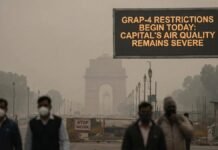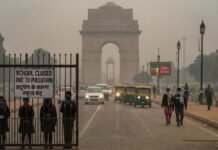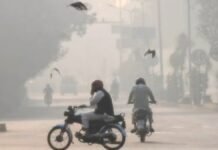
Delhi: The national capital plunged into a severe air quality crisis on Wednesday as the Air Quality Index (AQI) soared to 418, marking the season’s first entry into the “severe” category. The drop in temperature overnight led to a dense layer of toxic smog blanketing Delhi and surrounding NCR regions, further escalating health concerns and travel disruptions.
Delhi’s AQI Hits 418; NCR Cities Follow Close Behind
According to data from the Central Pollution Control Board (CPCB), Delhi’s AQI reached a worrying 418. Neighboring cities also faced hazardous air quality levels, with Gurugram recording an AQI of 321, Noida at 359, Greater Noida at 364, and Faridabad at 262. Out of 36 monitoring stations across Delhi, a staggering 30 stations recorded air quality in the ‘severe’ category.
As per CPCB’s scale, an AQI above 400 falls into the “severe” category, where prolonged exposure can severely impact respiratory health. An AQI reading between 401 and 450 is considered “severe,” while anything above 450 is categorized as “severe plus.”
Dense Smog Blankets Delhi, Reducing Visibility and Triggering Travel Disruptions
Residents woke up to thick smog that reduced visibility drastically, creating dangerous conditions for morning commuters. The low visibility took a toll on air and rail travel as well: eight flights scheduled for landing at Delhi’s Indira Gandhi International Airport were diverted due to poor visibility. Seven flights were redirected to Jaipur, and one to Lucknow. Rail traffic was also impacted, with trains approaching Delhi forced to slow down to navigate safely through the dense haze.
Emergency Measures on Hold as Air Quality Shows Signs of Easing
In response to the escalating pollution levels, the Commission for Air Quality Management (CAQM) convened to assess whether Stage III of the Graded Response Action Plan (GRAP) should be implemented. This would enforce restrictive measures such as stopping construction activities and limiting vehicular movement. The CAQM reported that air quality may show a marginal improvement by Thursday, potentially shifting back to the “very poor” category. The Sub-Committee of CAQM has decided to closely monitor pollution levels and revisit potential restrictions depending on the trend in air quality.

Public Health Alert as AQI Remains Hazardous
With air pollution lingering in the “severe” zone, health officials are urging residents to limit outdoor activities and use protective masks when stepping out. Long-term exposure to this level of pollution can cause respiratory and cardiovascular issues, particularly for vulnerable groups such as children, the elderly, and those with pre-existing health conditions.






















































